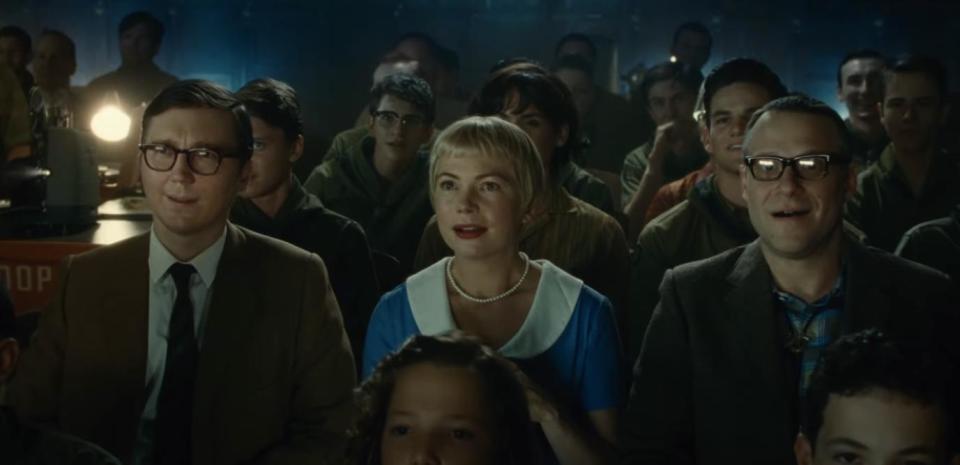Every so often, a director would finally make a film so personal to them that it becomes either their masterpiece or a misguided passion project. If they’re lucky, it could be like Francis Ford Coppola’s “Apocalypse Now.” Otherwise, it could be so befuddling that others begin considering it the director’s rare misfire.
“The Fabelmans,” Steven Spielberg’s latest film that directly borrows from his childhood, fortunately belongs to the former category. Directing a story he co-wrote with frequent collaborator Tony Kushner, Spielberg digs deep into the recesses of his memory—and delivers 2½ hours of pure cinematic poetry in motion.
And by bringing back the old reliables for this passion project—from Janusz Kamiński’s gorgeous cinematography to John Williams’ reportedly penultimate film score work before retirement from the medium—we are treated to one of the best movies of 2022.

A Film for People Who Love Movies (and Every Passion that Lies in Between)
“The Fabelmans” introduces the audience to Sammy Fabelman (Gabriel LaBelle), a fictionalized version of Spielberg himself. Loosely based on the director’s adolescence and growing pains as an aspiring filmmaker; the film also focuses on Sammy’s family and other people who would help shape up his worldview for better or for worse.
Growing up in a loving albeit dysfunctional Jewish household, a younger Sammy (played by Mateo Zoryon Francis-DeFord) first fell in love with movies when his parents Mitzi and Burt (Michelle Williams and Paul Dano) took him to see his first motion picture, “The Greatest Show on Earth.” Moved by the film’s spectacle, Sammy proceeds to recreate a scene from the movie by crashing an actual model train he asked for Hanukkah.
His parents, though both supportive of his love for film at an early age, see Sammy’s passion differently. Burt, the family’s breadwinner and a computer engineer by profession, sees it as no more than a hobby. He has even envisioned Sammy taking up a similar profession once the latter grew up. On the other hand, Mitzi—a skilled pianist—sees through the spectacle and into her son’s heart. This understanding later serves as Sammy’s push when the going gets tough.
However, Mitzi’s words and Sammy’s love for her collide when his filming and editing of one particular family event lead him to a shocking discovery that could break the family apart. Add to this the bullying he receives at school, and it’s understandable if Sammy begins to question whether his love for making movies is really worth it.
On the (Taxing) Pursuit of Happiness
As with most movies that deal with a protagonist’s quest for something much bigger than life, “The Fabelmans” follows a relatively basic narrative structure. In fact, a few of Spielberg’s films employ this flow; and his latest outing might not even be the best of the lot. But what it lacks in narrative surprises, it more than makes up for its heart. The performances elevate it even further, making the standard “if it consumes you, follow your heart” a moving affair to watch on the screen. For what it’s worth, this is Spielberg’s semi-autobiographical version of Giuseppe Tornatore’s “Cinema Paradiso.”
Apropos to the pursuit of passion mentioned above, the film actually shows several scenes featuring people around Sammy telling him one by one that pursuing what he loves best might entail conflicts with one’s self, the societal expectations, and his own family. Understandably, such hammering can feel overbearing; but this critic firmly feels that it’s Spielberg’s point.
From Sammy’s surrogate uncle Benny (Seth Rogen in one of his best roles ever) to his eccentric great uncle Boris (Judd Hirsch in an Oscar-worthy scene-stealing role); Sammy comes to the conclusion that, yes, conflicts can arise along the way toward his pursuit of his passion. But at the same time, he can wield the power of films to help him see the truth, not only about his family, but also about himself.
‘The Fabelmans’: Spielberg’s Deeply Personal Ode to His Family
In a roundtable panel, co-writer Tony Kushner stated that he and Spielberg first met on the shoot of “Munich” in 2005. As they got to know each other, Kushner asked the director about the time when he decided to become a filmmaker. Spielberg’s response, which Kushner remarked Spielberg should make a movie of, would serve as the central incident in “The Fabelmans.”
Why it took the director that long to make it into a film isn’t surprising, especially when the events retold in “The Fabelmans” are more personal than his earlier outings. Indeed, classics like “E.T. the Extra-Terrestrial” and “Close Encounters of the Third Kind” touch upon elements of Spielberg’s childhood. And for the longest time, the latter came the closest to depicting the director’s parents, as the late James Lipton once masterfully pointed out.
But “The Fabelmans” tackles his upbringing head-on, warts and all. His family’s constant moving as his father receives new work reassignments, the first home movie he made at age 12, the anti-Semitism he regularly suffered in school, his parents’ divorce; all these are Spielberg dusting off memories that he might have bottled up for so long and adapting them all onscreen.
Steven Spielberg might have taken quite a while to make “The Fabelmans,” and for all the understandable reasons. But selfishly, this critic thanks the filmmaker for the decision to relive his pain to tell a story that has the makings of a modern classic. Make no mistake about it: this is easily one of the best movies of the year.
“The Fabelmans” is now showing in theaters.
Support the Site: Consider becoming a sponsor to unlock exclusive, member-only content and help support The Movie Buff!